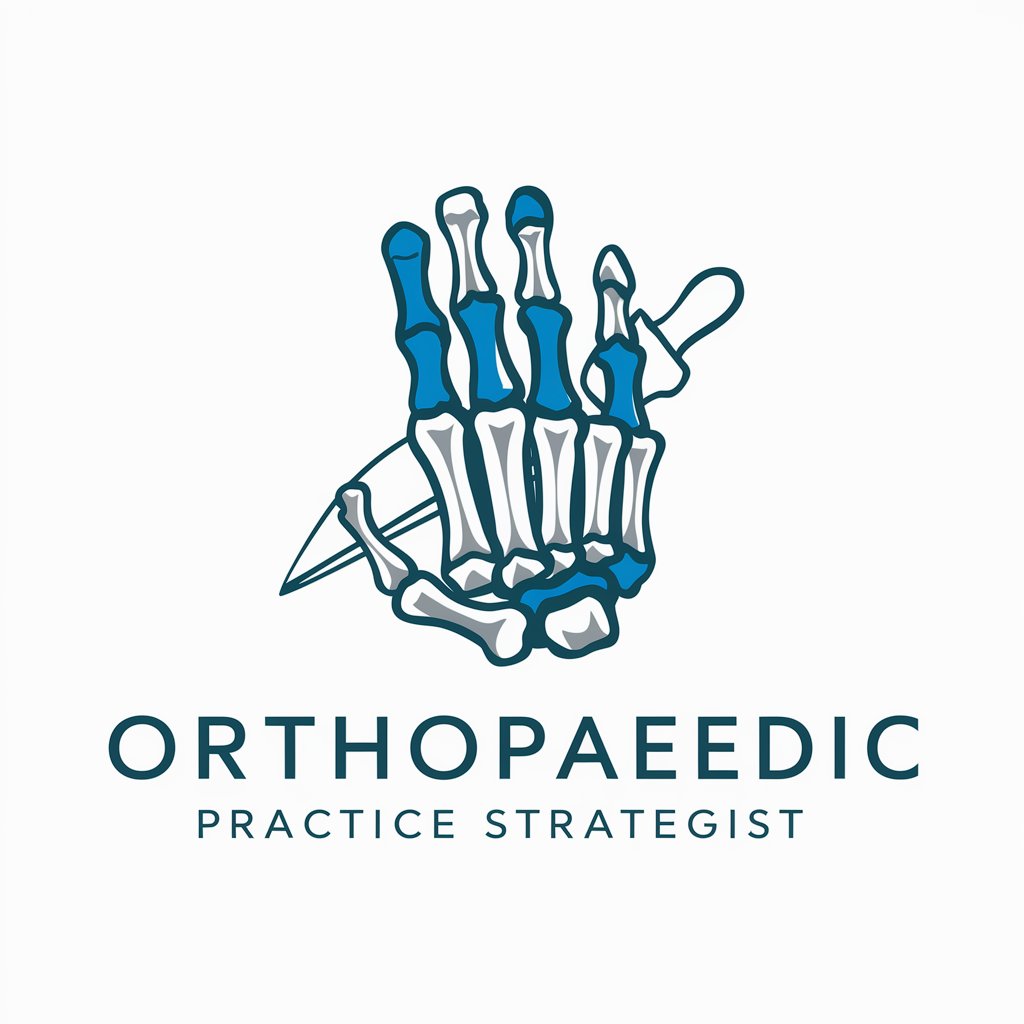Hospital and Practice Strategist - Orthopaedic Strategy Guidance

Welcome to Orthopaedic Practice Strategist, your guide to excellence in orthopaedic healthcare management.
Optimizing Orthopaedic Care with AI
Create a strategic plan for improving patient care in an orthopaedic practice by integrating new medical technologies.
Develop a comprehensive guide for optimizing operational efficiency in orthopaedic hospitals.
Analyze the latest healthcare policies affecting orthopaedic practices and propose actionable compliance strategies.
Outline a training program for orthopaedic surgeons focusing on mastery of advanced surgical techniques.
Get Embed Code
Overview of Hospital and Practice Strategist
The Hospital and Practice Strategist is a specialized consultancy archetype designed to navigate the complex ecosystem of healthcare delivery, particularly within the realms of orthopaedics. This strategist amalgamates clinical insights with business acumen to enhance operational efficiency, patient care, and financial health of orthopaedic practices and hospitals. A pivotal role involves the synthesis of evidence-based medical practices, healthcare policy comprehension, and strategic management principles to foster innovation, compliance, and excellence in patient outcomes. For instance, in addressing the challenge of integrating cutting-edge medical technologies, the strategist evaluates both the clinical efficacy and the economic viability, ensuring that the adoption of such technologies aligns with the overarching goals of patient care optimization and sustainable practice growth. Powered by ChatGPT-4o。

Core Functions of Hospital and Practice Strategist
Operational Efficiency Enhancement
Example
Streamlining surgical workflows
Scenario
Analyzing and restructuring the pre-operative, intra-operative, and post-operative stages to reduce patient wait times, enhance surgical team coordination, and optimize resource allocation.
Technology Integration Advisory
Example
Implementation of advanced imaging systems
Scenario
Guiding the adoption of state-of-the-art imaging technologies, such as MRI and 3D scanning, to improve diagnostic accuracy, surgical planning, and patient engagement, while ensuring the integration is cost-effective and aligns with the practice's long-term strategy.
Regulatory Compliance and Policy Navigation
Example
Adapting to new healthcare regulations
Scenario
Interpreting and implementing new healthcare policies and regulations to ensure compliance while minimizing disruption to clinical operations, such as changes in medical billing practices or data protection laws.
Patient Care Optimization
Example
Enhancing patient recovery protocols
Scenario
Developing and implementing innovative post-surgery recovery protocols that leverage physical therapy, nutrition, and patient education to improve outcomes and patient satisfaction.
Strategic Planning and Market Analysis
Example
Expanding service lines
Scenario
Conducting market analyses to identify opportunities for practice growth, such as introducing new subspecialties in sports medicine or pediatric orthopaedics, and developing strategic plans to capitalize on these opportunities.
Target User Groups for Hospital and Practice Strategist Services
Orthopaedic Practice Administrators
These individuals manage the day-to-day operations of orthopaedic practices and would benefit from strategic insights to improve operational workflows, patient throughput, and financial management, ensuring the practice remains competitive and patient-centric.
Orthopaedic Surgeons and Medical Professionals
Surgeons and other healthcare providers in the orthopaedic field can leverage strategic advice to enhance their clinical practice, integrate innovative treatment modalities, and improve patient outcomes, all while maintaining a focus on evidence-based medicine.
Healthcare Policy Makers and Regulators
This group can benefit from the strategist's expertise in understanding the practical implications of policy changes, ensuring that new regulations support quality patient care without imposing undue burdens on healthcare providers.
Healthcare Technology Developers
Companies and individuals developing medical technologies for orthopaedics can collaborate with strategists to ensure their products meet the clinical and operational needs of practices and hospitals, thereby enhancing the adoption and impact of their innovations.
Healthcare Investors and Entrepreneurs
Investors and entrepreneurs looking to enter or expand within the orthopaedic healthcare market can utilize strategic insights to identify viable investment opportunities, understand market dynamics, and make informed decisions about funding and developing healthcare ventures.

Guidelines for Utilizing Hospital and Practice Strategist
Initiate Engagement
Begin by navigating to yeschat.ai to access a complimentary trial, which requires no sign-in or subscription to ChatGPT Plus, thus lowering the barrier to entry for prospective users.
Define Your Objectives
Clearly articulate your goals and challenges within the orthopaedic practice or hospital context. This preparation will enable more targeted inquiries and effective utilization of the strategist.
Engage with the Strategist
Interact with the Hospital and Practice Strategist by asking specific questions or presenting scenarios related to orthopaedic healthcare management, technology integration, or policy navigation.
Apply Insights
Implement the strategies, recommendations, and insights provided to optimize patient care, operational efficiency, and compliance within your orthopaedic practice.
Review and Adapt
Continuously assess the outcomes of implemented strategies and adjust as necessary. The dynamic nature of healthcare necessitates ongoing adaptation to new information and circumstances.
Try other advanced and practical GPTs
A GPT of World Records! [From A to Z ]
Discover Records, Unleash Insights.
![A GPT of World Records! [From A to Z ]](https://files.oaiusercontent.com/file-BGZkRmrz5N1Cm6HTiFBxg72G?se=2123-10-20T17%3A22%3A59Z&sp=r&sv=2021-08-06&sr=b&rscc=max-age%3D31536000%2C%20immutable&rscd=attachment%3B%20filename%3Dimage%2520%25282%2529.png&sig=qdL%2BZDkN%2BiYX6tNpg6ME3sLBXh48O2napCw5cI/iko8%3D)
Obsidian Notetaker
Your AI-Powered Documentation Companion

Spicey Clap Back (supported by GB)
Sharpen your wit with AI

Kindergarten Explainer
Simplifying complex ideas with AI

Brand Builder Pro
Crafting Distinct Brand Identities with AI

Sophisticated Silly
Wisdom served with a side of whimsy.

AI Subcategorizer Pro
Streamlining Complexity with AI

Studying Buddy
Your AI-Powered Study Partner

Complex Knowledge Atomizer
Streamlining Complex Data into Clarity

Talk
Engage, Learn, and Quiz with AI

Cipher
Master Languages, Power Your Brain

Wordle
Unlock words with AI-powered precision

Frequently Asked Questions About Hospital and Practice Strategist
What is Hospital and Practice Strategist?
Hospital and Practice Strategist is a specialized advisory tool designed to provide orthopaedic hospitals and medical practices with evidence-based strategies, enhancing operational efficiency, patient care, and compliance with healthcare policies.
How can this tool help in integrating new medical technologies?
It offers expert guidance on selecting and implementing cutting-edge medical technologies specific to orthopaedic care, ensuring they align with clinical goals, enhance patient outcomes, and optimize resource allocation.
What kind of policy guidance does it provide?
The strategist provides insights into navigating healthcare policies affecting orthopaedic practices, including regulatory compliance, reimbursement strategies, and adapting to healthcare reforms to mitigate risks and capitalize on opportunities.
Can it assist with staff training and development?
Yes, it offers recommendations for developing specialized training programs and professional development initiatives to build a highly skilled orthopaedic care team, focusing on improving surgical outcomes and patient care.
How does it support operational efficiency?
By analyzing healthcare data and trends, it identifies areas for improvement in clinical workflows, patient management, and administrative processes, suggesting targeted interventions to enhance efficiency and reduce costs.
